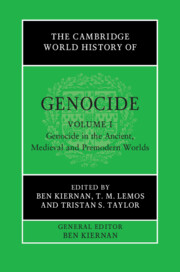Book contents
- The Cambridge World History of Genocide
- The Cambridge World History of Genocide
- The Cambridge World History of Genocide
- Copyright page
- Contents
- Figures
- Maps
- Tables
- Contributors to Volume I
- General Editor’s Acknowledgements
- General Editor’s Introduction to the Series
- Introduction to Volume I
- Part I Themes of Genocide through History
- Part II The Ancient World
- 6 Genocide in Ancient Israelite and Early Jewish Sources
- 7 Genocide in Ancient Mesopotamia during the Bronze and Iron Ages
- 8 Urbicide in the Ancient Greek World, 480–330 bce
- 9 Violence, Emotions and Justice in the Hellenistic Period
- 10 A Tale of Three Cities
- 11 Caesar’s Gallic Genocide
- 12 Genocidal Perspectives in the Roman Empire’s Approach towards the Jews
- 13 Religious Violence in the Later Roman Empire
- 14 Genocide, Extermination and Mass Killing in Chinese History
- Part III The Medieval World and Early Imperial Expansions
- Index
8 - Urbicide in the Ancient Greek World, 480–330 bce
from Part II - The Ancient World
Published online by Cambridge University Press: 23 June 2023
- The Cambridge World History of Genocide
- The Cambridge World History of Genocide
- The Cambridge World History of Genocide
- Copyright page
- Contents
- Figures
- Maps
- Tables
- Contributors to Volume I
- General Editor’s Acknowledgements
- General Editor’s Introduction to the Series
- Introduction to Volume I
- Part I Themes of Genocide through History
- Part II The Ancient World
- 6 Genocide in Ancient Israelite and Early Jewish Sources
- 7 Genocide in Ancient Mesopotamia during the Bronze and Iron Ages
- 8 Urbicide in the Ancient Greek World, 480–330 bce
- 9 Violence, Emotions and Justice in the Hellenistic Period
- 10 A Tale of Three Cities
- 11 Caesar’s Gallic Genocide
- 12 Genocidal Perspectives in the Roman Empire’s Approach towards the Jews
- 13 Religious Violence in the Later Roman Empire
- 14 Genocide, Extermination and Mass Killing in Chinese History
- Part III The Medieval World and Early Imperial Expansions
- Index
Summary
'Urbicide' is a Latin formation - as deployed in this chapter, it refers to the total or near-total destruction of cities (poleis) of the ancient Greek/Hellenic world between the 6th and the 4th centuries BCE. Urbicide was an extreme measure of interstate politics, but not as rare as one might have predicted - or hoped. It represented the other, dark side of the ancient Greeks' fierce attachment to their own native polis. In some cases a polis might be removed from the map once and for all (e.g. Arisba on the island of Lesbos). In others, it might be only temporarily annihilated (Thebes). In all cases, the possibility of largescale enslavement of formerly free Greek citizens was ever-present, and often was realised.
Keywords
- Type
- Chapter
- Information
- The Cambridge World History of Genocide , pp. 235 - 256Publisher: Cambridge University PressPrint publication year: 2023

